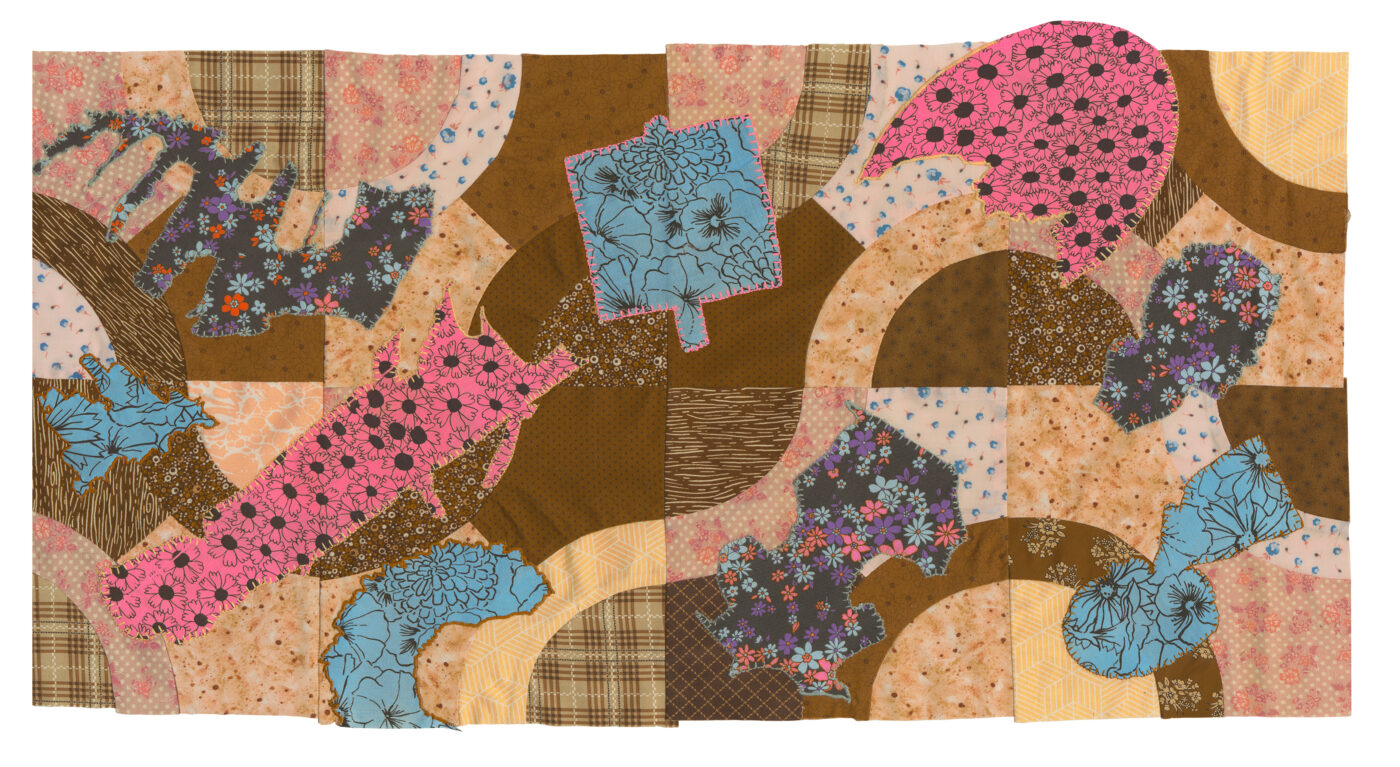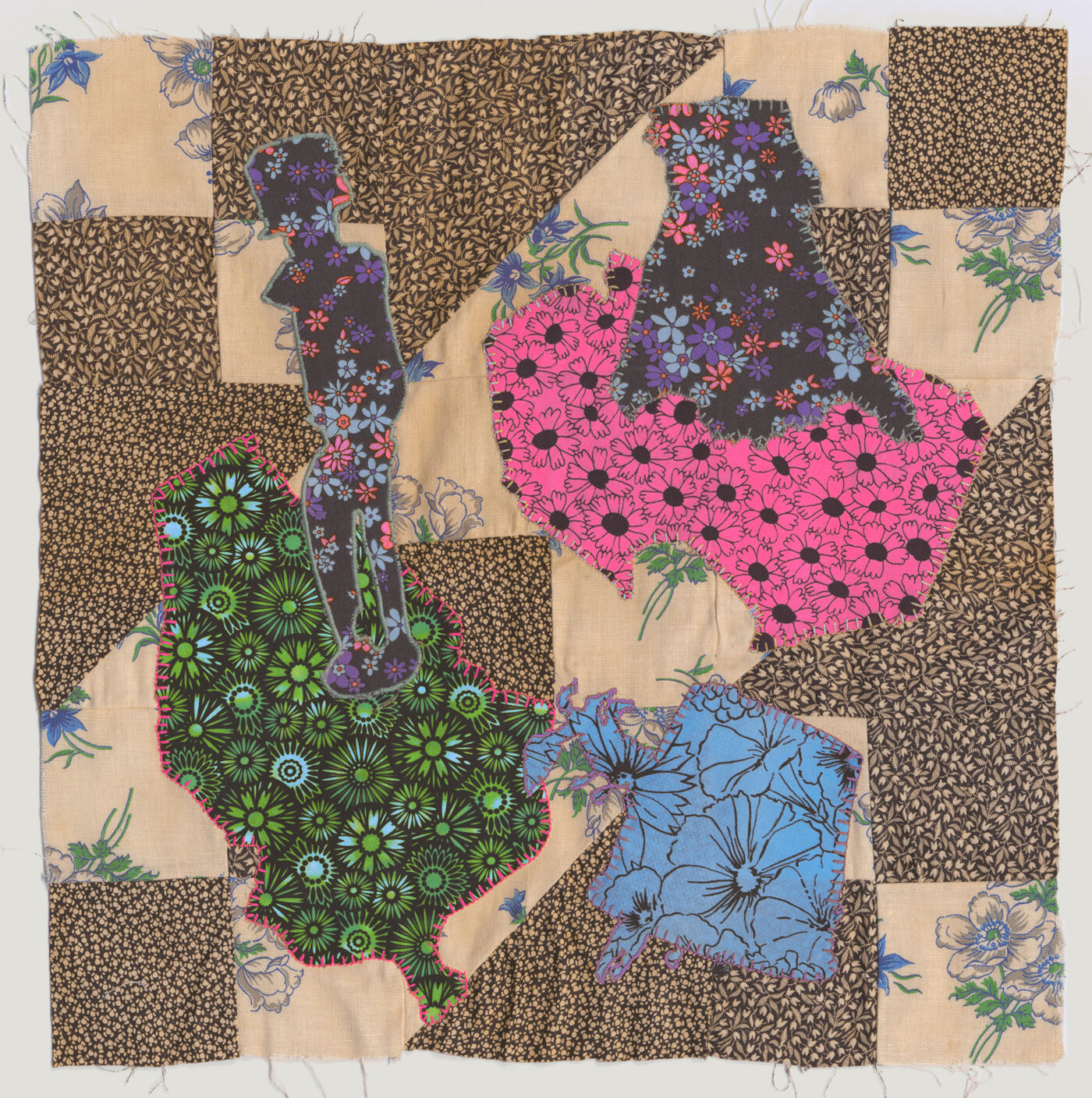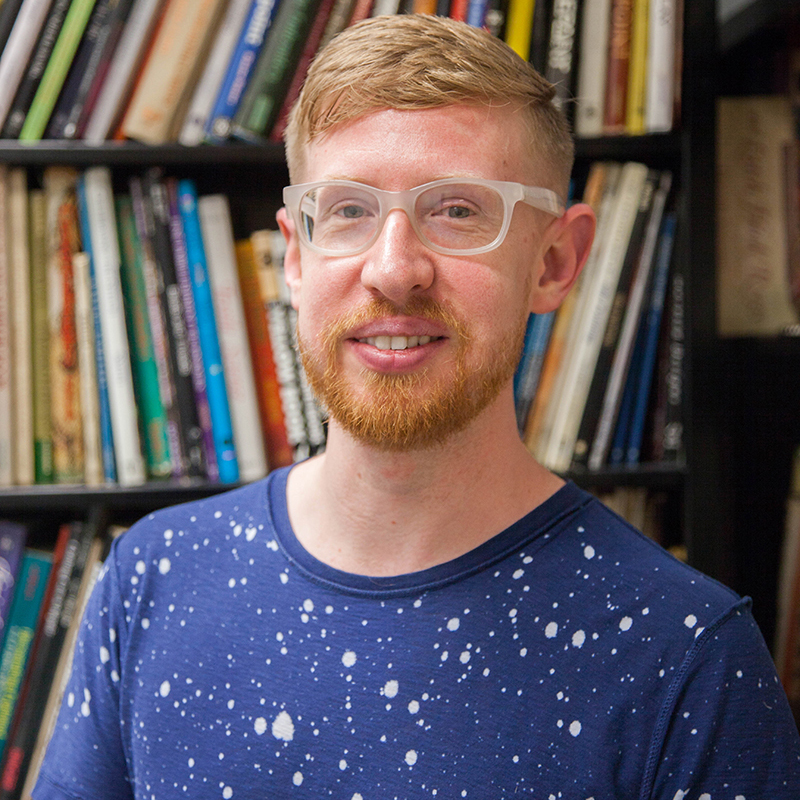Quilt

“There is nothing new under the sun, but there are new suns.”
—
Octavia
E. Butler

4–5 minute read, or the time it takes to peruse a photo album.
Quilts are legacy objects that embody care, not only as material comfort, but as a symbol of kinship, of lives deliberately sewn together to make something new. We invited Aaron McIntosh to make a quilt that embodies queer kinship. In reference to the writings of queer theorist José Esteban Muñoz, the resulting quilt blocks use tracings of magazines and ephemera that recall their source material but also create new, abstract images that move throughout the squares. Resulting in strange and intimate couplings on changing backdrops, the source material is deliberately obscured, leaving behind evocative forms that gesture to connectedness, warmth, and deep feeling.
Oh, kinship. How grateful I am for finding you as a space in-between or alongside. Before, I was lost, caught between a sense of obligation to my birth family and a longing for connection to those who are truly like me. Kinship is both something I have always known, and something I am still navigating.
I was born into a rather large extended family, which was tight-knit and very connected through many traditions, most particularly farming, foodways, religion, woodworking, quiltmaking, and what we generally refer to as “making do.” Often reminded that “blood is thicker than water,” the passing on of these methods was a way to reinforce those bonds, with the expectation that I would pass them onto my own progeny someday. Despite best efforts, only a few of these skills would remain important legacies in the life I have molded, and that has formed around me.
As my queerness became more evident to myself, and eventually my family, a hole began to widen in our connectedness, hastened by my leaving home for school, and eventually for work. Forced to find emotional support outside of family, several female friends offered the earliest bonds of kinship I would find comfort in. When I gained the courage to start meeting and loving other gay men and queer people, a new sense of belonging washed over me. Teaching each other queer ways, storytelling ourselves into this world, fighting off trauma together, finding our own sense of humor and camping it up — I had found my people.

[ID: High-res scan of rectangular mini quilt comprised of eight small squares. Abstract shapes are sewn and edges embroidered over a multi-layered background, which is composed of patterned fabrics in browns, tans, and light pinks. Curved lines seem to meander across the quilt. The patches on top are bright blue, pink, and purple. The edges of the quilt have been left raw. ]
Kinship is around me at all times. I sit in a studio where the materiality of kinship is folded into neat piles organized by color, or spills out of overstuffed boxes. Fabrics that have been handed down to me from several family generations. T-shirts and patches from punk-infused teenage friendships. Letters from friends and family that trace the eras and shifting places I have called home. Underwear that holds stains and memories of so many former boyfriends and lovers.
The writings of queer theorist José Esteban Muñoz shifted my thinking about time, queerness, and legacy. He offers that queerness is something which is “not yet here,” ¹ a perpetual performance to mark our identities. For him, our queerness is passed down surreptitiously from one generation to the next through temporal acts, performances, and material ephemera to evade scrutiny or violence that might accompany more marked visibility. Muñoz referred to these performative ephemera as “traces, glimmers, residues, and specks of things,” ² and believed in them as distinctly material.

[ID: High-res scan of square mini quilt. Abstract shapes are sewn and edges embroidered over a multi-layered background, which is composed of patterned fabrics in browns and tans. The patches on top are bright blue, pink, and purple, utilizing some of the same fabrics from the previous quilt squares. The edges of the quilt have been left raw.]
In these indiscernible shapes, overlapping figures and funky negative spaces, I see the outlines of my kinship: imprecise but comfortable, stitched together from queer kin and birth family.
These quilt blocks are a nod to Muñoz’s ephemera, as I have approached the theme of kinship by taking “tracings” from LGBTQ+ icons, symbols, protests, moments of intimacy, archives, and other sources across time and place. As pared-down silhouettes, these tracings become intentionally abstract, focusing less on recognition and legibility, and more on chance preponderances of such figures. The tracings are composed of fabrics also across time and kinship from my stash, and they are appliquéd onto plain fabric and quilt blocks handed down to me from my grandparents. While I have been using queer tracings and archival silhouettes in my practice for some years now, this Kinship Quilt series has proved a new way to consider bringing a wider swath of influences into my piecework. In these indiscernible shapes, overlapping figures, and funky negative spaces, I see the outlines of my kinship: imprecise but comfortable, stitched together from queer kin and birth family.
—
¹ Muñoz, Jose Esteban (2009). Cruising Utopia: The Then and There of Queer Futurity. NYU Press.
² Muñoz, José Esteban (January 1996). “Ephemera as Evidence: Introductory Notes to Queer Acts”. Women & Performance: A Journal of Feminist Theory. 8 (2): 5–16.

[ID: Artist Aaron McIntosh sits in front of a small library of textile books. He wears a navy t-shirt with bleach splatters, translucent framed glasses.]
Aaron McIntosh
He // Him // His
Kingsport, TN
Aaron McIntosh is a cross-disciplinary artist whose work mines the intersections of material culture, family tradition, sexual desire, and identity politics in a range of works including quilts, sculpture, collage, drawing, and writing. As a fourth-generation quiltmaker whose grandparents were noted quilters in their Appalachian communities, he traces their legacies using quiltmaking as a language, form, and tool. The tradition of working with scraps is a primary platform from which he explores the patchworked nature of identity. Since 2015, McIntosh has managed Invasive Queer Kudzu, a community storytelling and archive project across the LGBTQ South.
His work has been exhibited widely in the US and internationally, most recently in Radical Tradition: Quilts and Social Change at the Toledo Museum of Art. His honors include fellowships from United States Artists, the Center for Craft, and the Virginia Museum of Fine Art. He has held residencies at the Banff Centre, Haystack Mountain School of Crafts and the Virginia Center for Creative Arts. His critical writing has been published in the Brooklyn Rail, Hyperallergic, the Surface Design Journal, and the Journal of Modern Craft. He currently lives and works in Montreal, Quebec, where he is an Associate Professor in the Fibres & Material Practices program at Concordia University.
